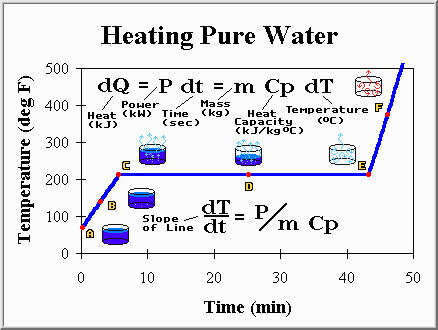Case Study: Petroleum
The chemical engineer is often faced with complex mixtures of
chemicals. In these mixtures some chemicals are valuable while
others may be worthless or even hazardous. The trick is to
separate the good from the bad without spending too much money along the way.
While there are quite a few separation techniques in a chemical engineer's bag
of tricks, distillation is the workhorse of the chemical industry.
It is fairly inexpensive and can produce very high purity products.
Because of this the petroleum industry has adopted it as their separation method
of choice. The towers pointing skyward at oil refineries are in
fact distillation columns, and their vast numbers reveal just how
frequently this unit operation is used.
But how does a distillation column work? To answer this we will first
observe how the world behaves, then try to understand why it works
the way it does. Finally we must figure out how we can use this knowledge for
our benefit. Following are descriptions of two experiments which will
hopefully illuminate the physical principles governing distillation.
Vaporization of pure components
Imagine filling a pot full of water (1 kg or 2.2 lbs) and placing it
on the stove. We turn on the burner (power of about 5 kW) and start
heating the water, hoping to eventually bring it to a boil. While it is
still cold lets stick a thermometer into the water so we may watch how
the temperature changes during the process. Here is what happens (ignore the
math if you like):

Point A: The water has just been placed on the burner. It is at
the temperature of the tap (70 degrees Fahrenheit), but with the addition of
heat from the burner it will not stay there long. Because the temperature is
below the boiling point the liquid is called "sub-cooled".
Point B: The water is slowly warming up. The water obviously
has a capacity to absorb heat and displays a temperature increase while
absorbing that heat (heat capacity of 4.2 kJ/kg C).
Point C: The first bubble (of water vapor) appears at the
bottom and rises to the surface. The bubble rises because steam is less dense
than water. This is to say that a given volume of vapor is always lighter than
the same volume of liquid. Gravity assures that the heavier fluid will displace
the lighter fluid, and a good thing or filling a drinking glass with water would
be a challenging process indeed.
Point D: More and more of the water is boiling off, being
converted from water to steam. No surprise there, however something unusual has
happened to our thermometer. It seems to have stopped rising, and hovers at 212
degrees Fahrenheit (100 degrees Celsius). The steam boiling off is also at 212
degrees Fahrenheit. Yet, the burner is still on, and is still much hotter than
the water, so heat is still flowing into the water. It seems as though when a
compound transforms from a liquid to a vapor some additional heat is absorbed.
This heat does not raise the temperature, instead it causes some water to
change to steam. Joseph Black observed this behavior in 1765 and called it
"hidden heat". Today it is called "latent heat" but the idea is the same.
Some heat, in fact a very large amount as evident by the long time needed to
finish boiling, is required to turn water into steam (2257 kJ/kg). Similarly,
steam gives off the same amount of heat when it is converted back to water. But
enough talk, lets continue to watch the pot and see what happens as we add more
and more heat.
Point E: The last drop of water boils away leaving us a pot full of
steam and air. The temperature now begins to increase once again and the
steam becomes "super-heated". The temperature grows rapidly because steam
has a lower heat capacity than water and most of the vapor has left the pot so
there is less material to heat up. Most cooks would remove the pot to prevent
damaging it, but let's leave it on the burner to see what happens.
Point F: The temperature of the vapor within the pot continues to
rise. It will increase until the pot, and vapor within it, finally reach the
same temperature as the burner. At this point, no more heat will flow and
the temperature will remain at a steady state.
Summary of our findings:
Pure compounds have a capacity to absorb heat, and in the
process warm up.
Pure compounds boil when they reach a temperature called their
boiling point. The temperature then remains constant, even though
heat is still being added, until all the liquid is boiled away.
While boiling, heat is absorbed, but no temperature increase is observed in
the liquid or the vapor. This hidden heat is called latent heat.
Once all the liquid is boiled off the temperature of the steam
will again increase, until the heat source and the steam are at the same
temperature.
Vaporization of mixtures
|

